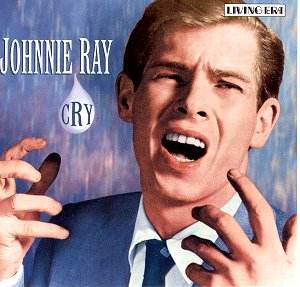 CD Reviews
CD Reviews MusicWeb
Webmaster: Len Mullenger
Len@musicweb.uk.net
[Jazz index][Purchase CDs][ Film MusicWeb][Classical MusicWeb][Gerard Hoffnung][MusicWeb Site Map]

Johnnie RAY
Cry
![]() Living Era CD AJA 5488 [76:14]
ADD
Living Era CD AJA 5488 [76:14]
ADD
Crotchet Budget price
Cry [3:03]
Whiskey and Gin [2:43]
The Little White Cloud That Cried [2:43]
Herb HENDLER and Doug ARTHUR - Coffee and Cigarettes [2:43]
Please Mr. Sun [2:57]
Here am I, Broken-Hearted [2:47]
Mountains in the Moonlight [2:47]
Walkiní My Baby Back Home [2:20]
Donít Blame Me [2:22]
All of Me [2:06]
A Sinner Am I [3:05]
Whatís The Use? [2:59]
Faith Can Move Mountains [2:47]
Love Me [2:08]
Donít Say Love Has Ended [2:12]
All I Do Is Dream of You [1:42]
Mister Midnight [3:13]
Please Donít Talk About Me When Iím Gone [1:58]
Somebody Stole My Gal [2:27]
Satisfied [2:56]
Iím Gonna Walk and Talk with My Lord [2:26]
With These Hands [3:21]
Ma Says, Pa Says (Duet with Doris Day) [2:50]
A Full-Time Job (Duet with Doris Day) [2:09]
Glad Rag Doll [2:15]
Oh, What A Sad, Sad Day [2:22]
An Orchid for the Lady [2:19]
Letís Walk That-A-Way (Duet with Doris Day) [2:36]
Tell the Lady I Said Goodbye [2:39]
Johnnie Ray is one of those artists that define a specific moment in time. His recording career lasted only from 1951-1958, and he was really only in his prime for the first half of that decade. However he really defined that fraction of time that bridged popular music in between Frank Sinatra and Elvis Presley. It is striking as one listens to these pre-Elvis recordings just how much like early Rock & Roll they sound.
The story of Johnnie Ray is quite a read as well. Born in a small Oregon farm-town, he lost most of his hearing in a childhood accident. In the late 1940s he moved to Hollywood, then Detroit, where he developed his unique singing style largely influenced by the need for him to over-enunciate and sing loudly to make his own singing line up with what he could hear through the use of the primitive hearing aids that were available to him. In 1953 he tried to have an ear surgery to repair the hearing in his left ear. Unfortunately the surgery left him totally deaf on the left side, and he had to resort to wearing hearing aids even on stage, which became a distraction both to him and to his audience. By the end of the 1950s he was overwhelmed with alcoholism and financial problems, and his promising career had been largely usurped by Elvis.
Even so, this collection of singles is remarkable. The original mono recordings are lovingly cleaned up and remastered. This is so obviously the Caucasian introduction to what would become Rock music that anyone unfamiliar with this will be truly surprised. Certainly the listener who remembers the original recordings will find them as fresh, energetic, and wonderful today as they were over 50 years ago. Additionally the fan of war-era music will enjoy the balladry that Ray was so renowned for, as well as the duets he did with Doris Day. This is quite a collection, very well done, and definitely worth a listen.
Patrick Gary